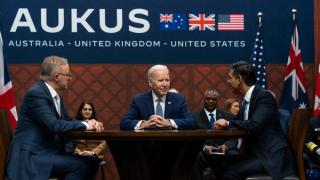Note: this annex is intended to supplement the ‘Recommendations’ section of the United States Studies Centre report, Breaking the barriers: Reforming US export controls to realise the potential of AUKUS, by Dr William Greenwalt and Tom Corben. Though the United States Studies Centre takes no institutional position on the following legislative and executive branch proposals as matters of policy, it nevertheless welcomes the recommendations offered here by Dr Greenwalt as valuable contributions to a debate of critical importance to the future of the Australia-US alliance.
Executive order recommendations
The President of the United States should issue an executive order to streamline export controls processes and procedures among the AUKUS nations addressing existing US technology, predominately allied technology, and jointly developed emerging technology in the following manner:
- Existing US technologies: The president should take maximum advantage of existing authorities to conduct program and open general licensing to streamline licensing requirements within a trusted industrial base.
AUKUS-specific program and open general licences should be specified and created. These AUKUS program and general licences should cover broad categories of existing already transferred defence items to ease the operational use and maintenance of these items within a generally accepted trusted community of private sector suppliers approved by each AUKUS nation within their country.
This industrial base should not be tied to the definitions laid out in the Defense Trade Cooperation Treaty. Instead, a mutually agreed-upon definition of a trusted industrial base should be established between the AUKUS countries to incentivise commercial industrial participation by working on innovative defence-relevant technologies and capabilities.
Specific program licences and open general licences should be established for the transfer of US guided-weapons technologies, so as to establish additional production capabilities within Australia among a jointly agreed-upon, trusted group of defence industry firms.
As a successor to the present Memorandum of Understanding between the AUKUS countries, a more permanent trilateral framework agreement on the provision of nuclear propulsion technology to Australia should be established, similar to the long-established relationship between the United States and the United Kingdom. - Existing Australian and United Kingdom technologies: Allied technologies transferred to the United States from AUKUS nations should be treated in a reciprocal manner as US technologies are treated in the AUKUS nations.
As such, any AUKUS country-aligned sustainment organisations working on non-US manufactured and designed equipment should be exempt from the International Traffic in Arms Regulations (ITAR) within US borders.
The extraterritorial application of the ITAR should be abolished for parts and components of defence articles (not containing sensitive mission data) that are returned to AUKUS Original Equipment Manufacturers for repair or maintenance, and the ITAR should not be applied to non-US-owned AUKUS intellectual property. - Joint development of emerging technologies: The president should take maximum advantage of ITAR 126.4 to establish AUKUS joint cooperative programs under the authorities of 10 USC 2350a in the following areas: undersea capabilities, hypersonics and counter hypersonics, quantum, artificial intelligence and autonomy, cyber, electronic warfare, biotechnology, future wireless networks, microelectronics, space, advanced materials, advanced computing, human-machine interfaces, and directed energy.
Within these cooperative programs, the knowledge and technical data produced by entities from different AUKUS countries should be controlled by each nation’s respective export control laws and regulations, and not be unduly subject to each other’s jurisdiction or control. A joint working group of senior officials from the AUKUS nations should meet to discuss any necessary harmonisation of export controls for the development and use of end-items produced from these cooperative programs.
Within the AUKUS nations, a de minimis standard should be established to determine the ultimate control of a defence end-item based on the transfer of technical data or defence services provided to a solution predominately developed in one AUKUS country.
Legislative branch recommendations
- ITAR exceptions: There are three statutory fixes that could provide the executive branch with clarity in the use of its discretion. The first is to add Australia and the United Kingdom to the Canadian exception, as follows:
Sec — Exception to Bilateral Agreement Requirement — Section 22 USC 2778(j)(1)(B) is amended to read:
Exception for Canada, United Kingdom, and Australia
The requirement to conclude a bilateral agreement in accordance with subparagraph (A) shall not apply with respect to an exemption for Canada, the United Kingdom, or Australia from the licensing requirements of this chapter for the export of defense items.
The second is to enable the modification of the implementing arrangements of the Defense Trade Cooperation Treaties (DTCT) to allow this ITAR exception to work in practice. This would allow for the modification of the makeup of the trusted industrial base communities that could allow the treaties to work as intended. Importantly, this would negate the need to create a plethora of program and open general licences and cooperative programs, as envisioned in the executive order solution. This could be accomplished by:
Sec — Removal of Restrictions on Changes to Implementing Agreement. Section 105 of P.L. 111-206 is repealed.
The entirety of P.L. 111-206 should be reviewed as to its impact on implementing the DTCTs. Much of it may need to be repealed or amended, but it is first necessary to allow for a mechanism for flexibility in the implementing arrangements.
Another, albeit more limited, statutory change could provide a carve-out exception for the United Kingdom and Australia on how technical data and services are treated. This would address most of the ITAR taint issues for both existing and emerging technologies developed in Australia and the United Kingdom and could be accomplished in the following manner.
Sec — Removal of Regulatory Transfer Requirement for Defense Services and Technical Data for AUKUS — For those countries identified in 2778j1(c) as an exception to the requirements of 2778(j)(1)(A) any defense articles produced or manufactured from technical data or defense services provided pursuant to a Technical Assistant Agreement, Manufacturing Licensing Agreement, or developed within a cooperative agreement shall be controlled under the export control requirements of the country of the final manufacturing of the defense item and will not be subject to the restrictions of ITAR 124.8(a)(5) and ITAR 126.18. - Changes addressing existing US technology: The Congress could, in stand-alone legislation, encourage the executive branch to use its existing authority to create AUKUS-specific program and open general licences. These AUKUS licences should cover broad categories of existing, already transferred defence items to ease the operational use and maintenance of these items within a generally accepted trusted community of private sector suppliers, approved by each AUKUS nation within their country. This industrial base should not be tied to the DTCT definitions but should be mutually agreed upon by the countries involved.
Sec — Treatment of Certain US Transferred Defense Items to AUKUS countries.
a) The President shall use to the maximum extent practicable with Australia and the United Kingdom program licenses and open general licenses to streamline export licensing requirements to meet AUKUS requirements within a trusted industrial base.
b) These licenses shall at a minimum address specific classes of defense items already transferred to ease the operational use and maintenance of these items within a generally accepted trusted community of private sector suppliers approved by each AUKUS nation within their country.
c) Program and open general licenses shall be used to transfer US guided weapons technologies to establish production capabilities within Australia covering a jointly agreed upon trusted group of firms in the United States and Australia. - Changes addressing existing Australian and UK technology and a trusted industrial base: In addition to addressing the ITAR taint in the above section it may be possible to do something similar by carving out an exception in the definition of technical data and services. It should also be possible to create a de minimis standard with the AUKUS allies, as well as to specifically address cases of concern to Australian and British companies to protect their intellectual property when exporting defence items to the United States.
Sec — Treatment of Certain AUKUS Transferred Defense Items to the United States.
a) The President shall establish de minimis standards to exempt the application of US export controls for technical data transfers and defense services by US persons performed on defense items transferred from Australia and the United Kingdom to the United States.
b) 1) AUKUS country-aligned sustainment organizations working on non-US manufactured and designed equipment shall be exempt from the ITAR within US borders.
2) The extra-territorial application of the ITAR shall not apply to parts and components of defense articles (not containing sensitive mission data) that are returned to Australian and UK companies who originally manufactured these items for repair or maintenance.
3) ITAR shall not be attached to any underlying non-US AUKUS intellectual property used on US weapon systems.
c) Section 2778(j)(4) is amended by inserting after “technical data” the following: “with the exception of articles transferred to Australia and the United Kingdom defense articles means defense items.” - Changes addressing joint development of emerging technology: Amending the definition of a defence article or the application of US-applied defence services and technical data as described above to focus on only controlling end-item hardware to the AUKUS nations should also address the ITAR taint issue with regard to joint cooperative programs. Still, it would be helpful to further clarify the non-application of US export contamination to cooperative programs in the following manner:
Sec — Treatment of Certain AUKUS Cooperative Development Programs.
a) The President shall within AUKUS:
1) maximize the use of authorities in ITAR 126.4 to include establishing joint cooperative programs under the authorities of 10 USC 2350a;
2) Establish joint cooperative programs in the following areas: undersea capabilities, hypersonics and counter hypersonics, quantum, artificial intelligence and autonomy, cyber, electronic warfare, biotechnology, future wireless networks, microelectronics, space, advanced materials, advanced computing, human-machine interfaces, and directed energy;
3) Ensure in these cooperative programs that knowledge and technical data produced shall be controlled by each AUKUS nation under their respective export control laws and regulations and not be subject to US jurisdiction or control under the Arms Export Control Act; and
4) Establish a joint grouping of the AUKUS nations to discuss any necessary harmonization of export controls for the development and use of end-items produced from these cooperative programs.






